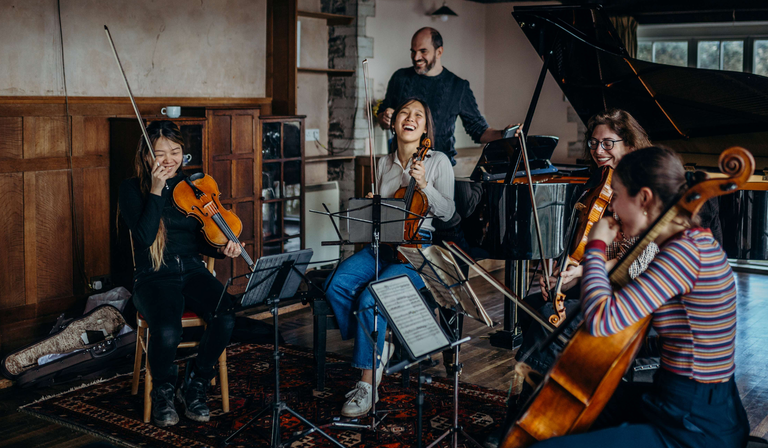Cornwall abounds with legends. In the 12th century, Geoffrey of Monmouth, writing The History of the Kings of Britain, placed the conception of King Arthur at Tintagel. An annual festival pageant held at St Agnes marks the defeat of Bolster, a tyrannical giant who was so large he stood astride the hilltops of Carn Brea and St Agnes Beacon, raining stones upon his rivals. A passerby meeting the three Midnight Washerwomen might be granted just as many wishes or could be killed instantly, depending on the direction in which he wrung the laundry.
In more recent memory, Cornwall was known as a smuggler’s paradise. Prussia Cove, in the west of the county, is particularly rich in history, taking its name from a smuggling Methodist called John Carter, something of a myth-monger himself, who as a child is said to have insisted on playing the role of Frederick the Great, the 18th-century king of Prussia, in games of soldiers with his brothers. Carter and his associates adapted caves and cut harbours out of the solid rock in order to conceal and store their contraband as it landed—secret hideaways now visited only by swimmers and innocent fishing boats.
At the centre of the Prussia Cove estate is Porth-en-Alls, a strikingly original stone Arts and Crafts house that sits peering into the sea below, with concealed passageways going down to some of Carter’s caves. It was the family home of Hilary Tunstall-Behrens, a violinist and former naval reserve officer, avid sailor and instructor in the Outward Bound movement. In 1971, Hilary managed to persuade his violin teacher, the great Hungarian musician Sándor Végh, to come and perform in Cornwall for the first time.
Végh was enchanted by the dramatic beauty and seclusion of this stretch of unspoilt coastline. It was the perfect setting for people to gather and immerse themselves in music, shielded from the demands and disturbances of everyday life, and he and Hilary jointly founded a course, the International Musicians Seminar (IMS), holding the first event the following year.
The early years of the course quickly established the extraordinarily high standard of students: Steven Isserlis (now the artistic director at IMS Prussia Cove); András Schiff; future members of the Alban Berg, Lindsay, Endellion and Takács quartets. Végh saw his mission as saving a living, cooperative tradition of music that could be traced back to Beethoven through the violinist Joseph Joachim (a close collaborator of Brahms) and his teachers—a tradition in danger of being destroyed by fascism and war as well as by commercialism and the recording industry.
Many of those musicians who studied and played with Végh now teach at IMS Prussia Cove themselves, forming a fellowship between musicians all over the world who have found sustenance in Végh’s ideals. In fact, Végh’s playing has even been disseminated beyond the boundaries of the planet: the Végh Quartet’s recording of Beethoven’s op. 130 string quartet was placed on Nasa’s Voyager spaceship as an example to alien life of humanity’s achievements on Earth.
There are now two seminars a year at IMS Prussia Cove. Every April, over two sessions of 10 days, professors give classes for violin, viola, cello, piano and chamber music to a select group of students. Isserlis’s class, for example, typically attracts about 130 applicants of the highest quality for just 11 places.
Open Chamber Music is held in September, when some of the young students are invited to join senior artists for a week to prepare and perform chamber music together—a powerfully direct method of passing traditions and knowledge down through the generations.
I am often struck by how vital the surroundings of Prussia Cove are to the seminar, and how they influence our imaginations. Almost every musician turns towards the window and references the movement or hue of the sea when discussing the pacing or atmosphere of a piece. I also suspect that the untamed and challenging nature of the environment might help to foster an attitude of original and independent thinking. In this rugged landscape dotted with simple, beautiful cottages, one can also relate to the folk roots of so much secular music, whether by Haydn, Beethoven, Dvořák or Janacek, and to its suggestion of honest and natural emotion uncorrupted by sentimentality, ego or superficial glossiness.
I first attended the masterclasses in 2010, studying with the legendary—and rather fearsome—Hungarian teacher Ferenc Rados. After introducing myself, he asked my age. “Eighteen,” I replied. “No,” he said, somewhat bewilderingly, “that is not an age I understand.” Among musicians, Rados’s sometimes acerbic but fiercely imaginative wit was famous, and his provocative, questioning, mocking way of speaking could shock students used to modern, western styles of teaching. After hearing one young violinist give a wildly virtuosic account of a Prokofiev concerto he sat in silence for almost a minute before slowly delivering his damning verdict, words dripping with irony: “You sound very suc-cess-ful.”
Personally, I found the absence of praise to be quite liberating for my inner approval addict. Nevertheless, I couldn’t resist feeling delighted when, very occasionally, Rados would grudgingly pass over a page, saying, “This I understood,” and once, memorably, “This was good.” He then quickly corrected himself: “Well, not good, but not dangerous.” Rados was also an infinitely patient teacher, indefatigably reaching for yet another metaphor, another way of demonstrating his meaning, and often stewing over musical puzzles for days at a time.
A few years later, I began participating annually in September’s Open Chamber Music. These seminars are an opportunity to question, to experiment and to enter another player’s point of view. They can be just as profound a learning experience as the masterclasses. The rare luxury of time engenders a deeply committed type of musical expression, uninhibited and uncompromised by external pressures and in pursuit only of itself. It also creates a spirited and light-hearted social atmosphere. Musicians clamber over rocks into the sea during rehearsal breaks, occasionally accompanied by passing seals, and sight-read chamber music late into the night.
In the world of music, the IMS has acquired near-mythic status as a haven of idealistic, meaningful and joyful musicmaking. It is the only course of its kind in Europe or, arguably, in the world—a magical place whose traditions remain vibrantly alive.












